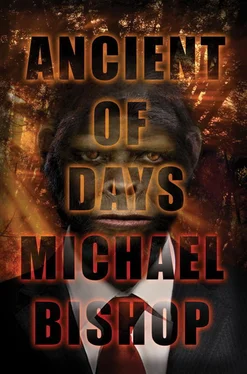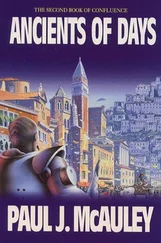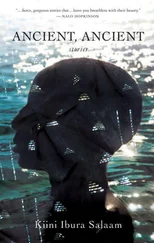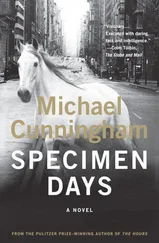“Does it make a difference?” I said, more hostile than inquisitive.
The Tonton Macoute kept smiling. “I am practicing my English is all. Sorry to trouble you so.” He touched his forehead again.
To make up for my rudeness, Caroline disclosed our names and said that we had come for business and pleasure. We were friends of Adam and RuthClaire Montaraz, the artists. Had he heard of them? (But of course.) Did he know anything about the habiline remnant from which Adam had supposedly sprung?
“Officially, I know nothing. Unofficially, I know it is hard to find this remnant because Papa Doc, the first Duvalier, well, he—” He gave an exaggerated shrug.
“What?” I urged him.
“He encouraged the local houngans —voodoo priests—to cast spells against these creatures. He said they were demons. And the priest most powerful on the island, Odilon Roi, was not only a famous houngan but also local chieftain of the security volunteers. Roi and his men cast bullets as well as spells at the habilines. This was over twenty years ago. A dozen or more of the little cigouaves were shot. My father was a civil volunteer under Roi and he remembers.”
“Duvalier, a medical doctor, thought the habilines were demons?”
“To carry out the vaudun persecution, Monsieur Loyd, yes. He feared any part of the population that had a certain—uniqueness. He thought such persons dangerous. They would corrupt others, or be corrupted. Castroites and Marxists would maybe turn the cigouaves against him. This, you see, made him decide they must go.”
Caroline said, “What would Baby Doc, your current President-for-Life, do if he heard you telling us these things?”
“Is it your wish to inform on me?” asked the macoute, smiling.
“Oh no! But if we went home and had your allegations printed in a newspaper as the story of a talkative civil guard on Montaraz, wouldn’t your loose tongue convict you as a traitor to the late Duvalier’s memory?”
“Things are freer under Baby Doc. Besides, I haven’t said my name, have I?” His big ivory teeth reflected sunlight off the water. “Do you suppose me the only security volunteer on the island?”
“What about all the habiline hunters who swept through here last fall?” I asked. “Did you tell any of those eager people your persecution story?”
“ Mais non, Monsieur .”
“Why not?”
“I had not heard it then. It was this recent sweeping-in of foreigners in quest of the cigouaves —the demon habilines—that reminded mon père of la petit terreur of twenty years ago. He told me the story but bade my discretion. It’s foolish to confess to outsiders the crimes of one’s own family. How do Americans say it? Hanging out the dirty laundry for the hoi polloi to gaze upon?”
“But you’re telling us ,” Caroline said.
“You are nicer people than the pushy ones who came last year. Also, it’s a good story, and maybe nobody anymore will see the cigouaves again. So what harm?”
“You think they’ve all been wiped out?”
“ Oui, Monsieur . A dozen deaths is no very formidable massacre—think of the thousands upon thousands whom Trujillo killed—but on this island it makes a type of genocide.” No longer smiling, he shook his head. “I had nothing to do with it. The sins of the father is not a doctrine I care to embrace.”
“Do you consider Adam Montaraz a demon?”
“Oh, no. He’s a great man, a great artist.” He touched the forward bulge of his beret. “Call upon me, please, if I may be of service to you during your sojourn here.”
“But what’s your name?” Caroline asked.
He looked over his shoulder at us. “Lieutenant Bacalou, Madame and Monsieur Loyd. Ask for me at our security headquarters in Rutherford’s Port.”
Only later did we learn that bacalou is a Creole word for an evil spirit, a demon or a werewolf that feeds on human flesh. But our Tonton Macoute was making no attempt to hide his identity from us; rather, he was giving us the fearful nom de guerre by which his comrades and some of the common people under his jurisdiction already knew him. We also learned that cigouaves , his term for the island’s elusive habiline remnant, has its own superstitious connotations. It refers to another kind of lycanthropic demon, creatures with wolfish bodies and human heads whose singular method of attack results in the violent emasculation of their victims. Lovely: We’d come to an enchanted isle, a land possessed by black magic and primitive dread. The police were bogeys, and anyone who opposed them was an upright piece of meat animated by a malignant spirit. You exorcised the demon by killing its host’s body. Never mind that the rifle-toting exorcists, the Tontons Macoutes, housed malicious demons of their own….
RuthClaire met us in Rutherford’s Port. The city consists of ancient quays, government buildings and churches of a pre-revolutionary Spanish architectural style, a series of palm-lined public squares, a military barracks, and, still at sea level, dozens of private residences designed and built around 1900 by such masters of Gingerbread Gothic as Eugène Maximilien and Léon Mathon. These houses feature balconies, cupolas, and arabesque grillwork even more fanciful than the gimcracks decorating the old Montaraz house in Atlanta. (I was beginning to see why Adam had bought that house.) The yellow bricks used for walkways, foundations, and low decorative walls, RuthClaire told us, had arrived in Rutherford’s Port as ballast in ships coming for the island’s coffee, sisal, and cacao. The most famous house in the city belonged to the grandson of local architect Horacius Dimanche, who’d attended the Paris School of Architecture with Léon Mathon. Later, if we wished, RuthClaire would give us a tour of the Old City.
Above the Old City, climbing the forested flank of the mountain behind it, were two distinct enclaves. On the western side: condominiums of steel and glass, charming old hotels and restaurants (survivors of a recent effort at urban renewal), and a monolithic terra-cotta business complex. On the eastern side: shacks with corrugated tin roofs, slatted or cardboard walls, and doors consisting of rusted scrap metal or ragged woolen blankets. Sunlight ricocheted among these hovels like a bouncing ball above the lyrics of an amelodic song. A sluice of mud ran down the slope of one precarious neighborhood from a broken pump supplying water for half of the hillside’s inhabitants. Shantytown’s only saving grace, in fact, was the open-air market at the foot of the mountain. It boasted colorful pennants, hundreds of booths with thatched roofs, and huge mounds of tropical fruits and vegetables. The bazaar abutted a section of the Old City, through which we rode in RuthClaire’s rented Jeep on our way up the coast to the secluded beach cottage where she and Adam were staying.
“He didn’t come himself,” RuthClaire explained, “because he creates a lingering sensation wherever he goes.”
“What about you?” Caroline said.
“Me? I’m just another American tourist. That’s why I picked you up. Adam’s a local hero, and he’s tired of being mobbed.”
“Don’t they follow you to your house?”
RuthClaire lifted her eyebrows at me. “The people? No. They lack wheels. When we first got here, the press asked for interviews, but we declined. Then Haitian security put out word we weren’t to be bothered. Militiamen with rifles go up and down the road fronting our beach property, patrolling—one or two at a time, on their way back and forth between coastal villages. They’re not actually assigned to us.”
“Tontons Macoutes?”
Читать дальше












